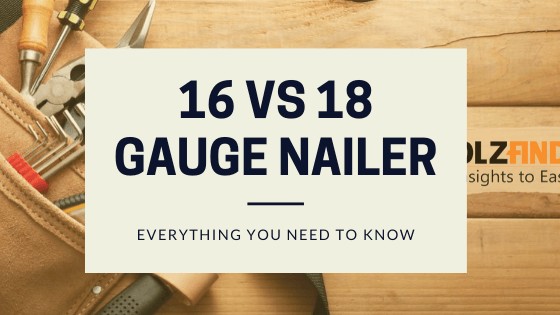You already got the idea of the different types of nailers and their applications or usages after doing a few pieces of research over the internet. And, you’re here as you’re confused about which one should be your choice to buy based on your requirements.
Hopefully, you’ll get the proper guidance after reading this guideline that will depict the comparison, 16 vs 18 gauge nailer.
Let’s get it started.
First of all, the digit of the gauge of a nailer (like 15, 16 or 18) is inversely related to its diameter. That means an 18 gauge nailer is smaller than a 16 gauge nailer. I know, you’re a little bit surprised but it’s true.
[amazon table=”1689″]
Let me explain this in a shorter description. In an inch dimension 16 pieces of 16 gauge nails are fitted well and for 18 gauge nails about 18 pieces. I hope, now you got the point of understanding the difference of 16 gauge and 18 gauge nails.
16g VS 18g Nailer: A Definitive Comparison

We already read the details of 18 gauge nailers and 16 gauge nailers separately. So, we’re going to show some comparison analysis now based on a few factors. These factors will make you understand to decide which factor will affect you and which will not.
Based on Usage
This is the very first factor to consider. Based on the usage you’ve to be precise which meet your requirement. For thicker boards or heavy woodworks finish nailer will work better, that means you need 16 gauge nailer. If you need to put nails on thinner board and any trim molding or crown molding then you’ve to go for 18 gauge nailer. So, for heavier woodwork use 16 gauge and for small and delicate trim work use 18 gauge nailer.
Nail Size
Nail sizes are different for different gauge sizes. So, if you’re looking for a solution to work on thicker boards you’ve to select bigger nail sized nailers. Nails of bigger diameter works better in thicker boards. In a thinner layer board nails of smaller diameter would be enough. Nail diameter of 16 gauge nailer is about 1.63 mm whereas 18 gauge nailer nail is of 1.022 mm.
Types of Woods
Types of woods where nails will be driven can be a factor to choose your nailer. Like, if you need to make a fence or frame outside your home mostly in the gardens then 16 gauge nailers would work better. As 18 gauge nails would be bent in the pressure of thicker woods. On the other hand, if it is a small piece of wood and you need just to attach them softly then choose 18 gauge nails.
Versatile Applications
16 gauge nailer can be the use of versatile applications as it is feasible for any kind of heavy woodwork. It causes almost permanent attachment as it’s very difficult to split the joint. On the other hand, 18 gauge nails are very delicate to split. It’s possible to split the attached woods with freehand.
Check 15g vs 16g Finish Nailer Differences.
16 Gauge Nailers
Let’s think about the current work process. People used to put nailer using a hammer one by one. If it’s a 10 feet longboard then so many nails need to be driven on this board. The risks are nails are not put straight all the time and hammer could be slipped over fingers.
As a result, a huge health disaster happens. You can easily reduce these risks by using a 16 gauge nailer. This tool puts each nail straight and smooth. No risk to damage one’s hand finger. Any kind of baseboard is easily covered with the pushing of nails with the help of this nailer.
Top 16 Gauge Nailers for You
[amazon bestseller=”16 Gauge Nailer” items=”3″ grid=”3″]
Let’s get details of 16 gauge nailers and their applications.
What is 16 Gauge Nailer?
Hopefully, you already got a clear idea about 16 gauge nailer. Despite that basic information let’s get familiar with some details. 16g nailer is one type of nail gun that uses 16g nails. The diameter of these nails is about 1.63 mm. 16 gauge nail is thicker than 18 gauge nail. And they’re mostly used in finish nailers.
Use of 16 Gauge Nailer
As we already know for finishing type applications, mostly in woods, 16 gauge nailer is used. Outdoor works are done using this nailer like fencing, framing, longer and thicker wood attachment etc.
Advantages
- No manual work needed
- Easy to put nails maintaining same distance
- Nails are set straight with maximum accuracy
- No hamper to health
When you should not use 16g nails
While setting up the trims and crowns or any other small woodworks you shouldn’t use 16 gauge nails as it could split or break the board.
18 Gauge Nailers
Think another situation, there are so many wood places in our houses where it needs to take your both hands along with a hammer to drive nails but you can’t reach there. 18g nailer can be your best option then.
Top 18 Gauge Nailers for You
[amazon bestseller=”18 Gauge Nailer” items=”3″ grid=”3″]
What is 18 Gauge Nailer?
18g nailer is a tool that uses 18g nails to be driven on wood boards or similar types of components. Its nail diameter is about 1.022 mm and any kind of sophisticated trim can be set easily using this tool. Its nail length is smaller than 16g nails.
Use
Whenever you’re thinking of connecting small pieces of wood 18g nailer can be of great help. You can save your thin boards from getting split and damaged. 18g nail diameter is thin board friendly.
Advantages
- No manual work needed
- Easy to put nails where manually hand don’t reach
- Nails are set straight accurately in any kind of thin board
- No hamper to the board and health as well
When you should not use 18g nails
For thicker board and heavy wood place 18g nails get bended. So, it could be harmful for your nailer as well. Don’t use this nailer for the heavy board.
Some FAQ’s
Can you use 18 gauge nails in a 16 gauge nailer?
18 gauge nails are used in a brad nailer. 16 gauge nails are used in finish nailers. The tool structure is different like hole size, nail size etc. So, it’s difficult and risky to use 18 gauge nails in a 16 gauge nailer.
Which is heavier 16 or 18 gauge?
As 18 gauge nails are made from heavy wire and 16 gauge nails are made from fine wire that’s why 16 gauge is heavier than 18 gauge.
Which is bigger 16 gauge or 18 gauge?
16 gauge is bigger.
What is thicker 16 gauge or 18?
16 gauge is thicker.
What gauge nail for trim?
Trims are used for trim molding and crown molding when the shortest things of wood or other materials are needed to be adjusted for decoration purposes. For such shorter decoration particles, 18 gauge nails work better and safer.
What gauge nails for crown molding?
Crown molding is very sophisticated and needs to be handled carefully. 16 gauge can damage these molding that’s why 18 gauge nails are used for crown molding.
Can you use 18 gauge nails for baseboards?
18 gauge nails wouldn’t be safe for baseboards as they are very thin and will bend while nailing any hard type surface. 16 gauge nailer would be perfect for such usage.
What are some other gauge nailers?
Except 16 and 18 gauge nailers, there are other nailers having 15 gauge, 21 gauge and 23 gauge nails.
Conclusion
I hope, you got proper guidance and comparison to choose anyone between 16 gauge and 18 gauge nailers. First of all, you’ve to figure out why you need a nailer. To be more specific, the purpose of using a nailer. Based on your requirements you can easily decide which would be better for your applications.
If you want to work on a baseboard that is thicker and heavier than you can use a finish nailer that means 16 gauge nailers. But, if you need to set up trims and another delicate component then you should definitely go for an 18 gauge nailer. I Hope, 16 vs 18 gauge nailer comparison helped you to decide already.

 March 23, 2020
March 23, 2020  7 Min
7 Min  No Comment
No Comment 




















